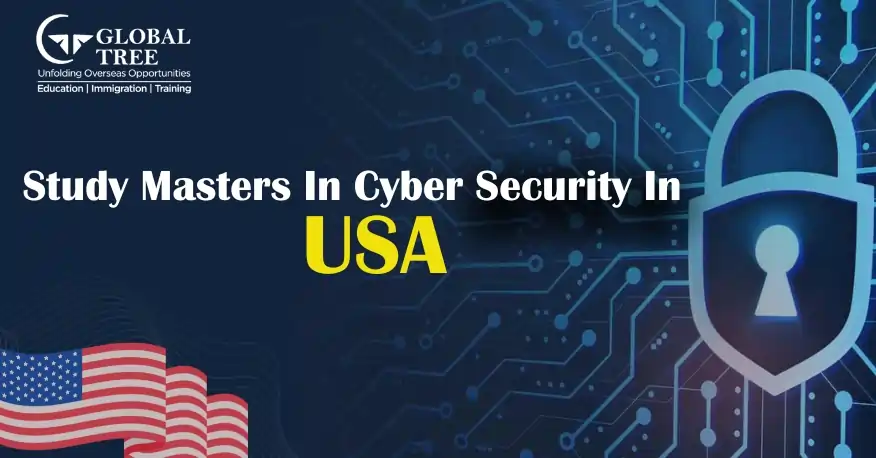Study Masters in Cyber Security in the USA: Only Guide You Need

- Introduction
- About the Masters in Cyber Security Course
- Types of courses for a Masters in Cyber Security
- How to get into a Masters in Cyber Security course?
- Course outline for a Masters in Cyber Security
- Top Universities in the US for a Masters in Cyber security
- The cost of a Masters in Cyber Security in USA
- Scholarships for learning about cyber security in USA
- What is the Average Pay for a Masters in Cyber Security in USA?
- What can you do with a Masters in Cyber Security after the Course?
- Masters Degrees in Cyber Security: what’s next?
- Masters Degree in Cyber Security: New Trends
- Masters in Cyber Security in the USA: FAQs and Comparison with Related Courses
- Conclusion
Introduction
As technology keeps getting better and better at a fast pace, the world is becoming more linked than ever before. This digital world has a lot of good things about it, but it also puts us at risk of cyber-attacks and security breaches all the time. Demand for skilled cyber security workers has gone through the roof because of the need to protect important information and digital assets.
In the United States, getting a Masters in Cyber Security is one way to become a cyber-guardian who has the knowledge and skills to protect against online threats. In this blog post, we will talk about the benefits of getting a Masters in Cyber Security in the United States. We will also talk about the program's main parts, the top universities that offer this programme, the admissions process, possible career paths, and new trends in the field of cyber security in the United States.
About the Masters in Cyber Security Course
What does it mean?
In the United States, a Masters in Cyber Security programme is meant to give students a deep understanding of the concepts, tools, and technologies of cyber security. The curriculum covers a wide range of themes, such as network security, digital forensics, cryptography, ethical hacking, and risk management. Graduates learn the skills they need to find cyber threats and deal with them successfully.
Who Needs to Study?
The Masters in Cyber Security course in the United States is perfect for people who love technology, fixing problems, and keeping important data safe. It brings in people with backgrounds in computer science, IT, and related fields who want to specialise in cyber security and take on challenging roles in this fast-paced area.
Why Learn?
Getting a Masters in Cyber Security in the United States has a lot of benefits. Universities in the United States are known for their cutting-edge study and new ways of teaching cyber security. Through hands-on experiences, internships, and real-world projects, the programme focuses on giving students useful skills that will help them do well in their careers. Also, the USA is a good place for cyber security professionals to live because its tech business is growing and there are many jobs available.
Quick Facts about a Masters in Cyber Security Course
- Usually lasts between 1 and 2 years.
- Network security, digital forensics, cryptography, ethical hacking, and risk management are the core subjects.
- You need to have a bachelor's degree in computer science, information technology, or a related area, be able to programme, and know how to speak English.
- Skills learned: cyber security research, responding to incidents, assessing vulnerabilities, and making security policies.
Types of courses for a Masters in Cyber Security
- Technical Cyber Security: Programmes that teach technical cyber security skills like penetration testing, digital forensics, malware analysis, and safe coding.
- Management and Policy: Cyber security programmes that focus on management and policy stress leadership, control, risk management, and the legal side of cyber security.
How to get into a Masters in Cyber Security course?
- Eligibility: A bachelor's degree in computer science, information technology, or a related area is usually needed to get into a Masters in Cyber Security programme in the United States. Some universities might let people in who have related work experience or cyber security certifications.
- Programming Skills: For expert cyber security programmes, you often need to know how to code in languages like Python or Java.
(Read More: Top Universities to study Cryptology abroad)
- Language Proficiency: International students usually have to take tests like the TOEFL or IELTS to show that they can speak English well.
- Application Documents: Academic transcripts, letters of recommendation, a statement of purpose, a CV or resume, and language test scores are some of the most common application documents that are needed.
Course outline for a Masters in Cyber Security
In the United States, the curriculum for a Masters in Cyber Security can vary from university to university, but it usually covers the following basic subjects:
- Network Security: This lesson looks at the weaknesses of networks, how to find intrusions, and how to protect networks from cyber threats.
- In Digital Forensics, students learn how to investigate cyber incidents, gather digital proof, and figure out how cyber-attacks happened.
- Cryptography: This is the study of algorithms that encrypt data, how to handle keys, and protocols for safe contact.
- Ethical Hacking: Students learn how to test and improve the security of systems and networks through ethical hacking.
- Risk Management: This lesson is about evaluating cyber risks, coming up with ways to reduce those risks, and following the rules.
- Security Policy and Governance: Students learn how to create and apply security policies, make sure they are followed, and manage cyber security programmes.
- Incident Response: This topic is about how to handle an incident, how to recover from an incident, and how to make plans for responding to an incident.
Top Universities in the US for a Masters in Cyber security
The demand for skilled cyber security professionals has surged in recent years, owing to the increasing frequency and sophistication of cyber-attacks. As a result, many prestigious universities in the United States have developed world-class Masters programs in Cyber Security to address this growing need for cyber defense experts. Let's delve deeper into some of the best schools in the world that offer exceptional Cyber Security programs:
Carnegie Mellon University
Carnegie Mellon University, located in Pittsburgh, Pennsylvania, is renowned for its CyLab, a leading center for cyber security research and education. The university offers a Masters in Information Security (MSIS) program, which is highly regarded in the country. The MSIS program at Carnegie Mellon focuses on cutting-edge technical knowledge, policy, and hands-on experience. Students gain a comprehensive understanding of information security, network security, cryptography, secure software development, and cyber risk management. Graduates of this program are sought after by top organizations and government agencies for their expertise in cyber security.
Massachusetts Institute of Technology (MIT)
MIT is a pioneer in science and technology education, and its Cyber Security program is no exception. The institution's Cyber Security policy is supported by a strong emphasis on scientific research and public policy considerations. The program at MIT prepares students to tackle the most complex cyber challenges through rigorous technical training and a deep understanding of the socio-political implications of cyber security.
Stanford University
Stanford University offers a multidisciplinary approach to its cyber security program, integrating technical knowledge with policy considerations. The Masters in Cyber Security program equips students with hands-on experience in security operations, incident response, and ethical hacking. Stanford's collaboration with industry leaders allows students to work on real-world projects and gain exposure to the latest cyber security advancements.
University of California, Berkeley (UC Berkeley)
UC Berkeley's cyber security program focuses on ensuring the safety of systems, networks, and data. The university offers a Master of Information and Cybersecurity (MICS) program that combines technical training with business and policy knowledge. Students learn to analyze and respond to cyber threats while considering the legal and ethical implications of cyber security measures.
(Read More: Is a degree in IT Security worth it?)
New York University (NYU)
NYU's Center for Cyber Security offers a comprehensive cyber security program that covers both technical and policy aspects of the field. The program provides students with a strong foundation in computer security, cryptography, malware analysis, and digital forensics. Additionally, students gain insights into the legal and ethical aspects of cyber security, preparing them for leadership roles in the industry.
The cost of a Masters in Cyber Security in USA
In the United States, the cost of tuition for a Masters in Cyber Security can vary based on the school and the length of the programme. A Masters in Cyber Security will cost foreign students an average of $30,000 to $60,000 per year. It is important for people who want to go to college to look into grants and other forms of financial aid, which can help make college more affordable.
Scholarships for learning about cyber security in USA
Students in the US who want to get a Masters in Cyber Security can choose from a number of scholarships and other forms of financial help. Some well-known awards are:
Fulbright Scholarships: The Fulbright programme gives foreign students scholarships to go to graduate school in the United States.
SANS Scholarships: The SANS Institute gives scholarships to students studying computer security, such as for GIAC certifications.
(ISC)2 Scholarships: (ISC)2 gives scholarships to people who want to get degrees in cyber security.
Scholarships offered by universities: Many universities in the United States offer scholarships to foreign students in cyber security programmes.
What is the Average Pay for a Masters in Cyber Security in USA?
The average salary for a Cyber Security worker in the United States can change based on experience, certifications, job role, and employer, among other things. On average, cyber security grads can expect to make between $70,000 and $100,000 their first year on the job. With experience and skill, salaries can go up a lot, and some professionals in leadership jobs earn six-figure salaries.
What can you do with a Masters in Cyber Security after the Course?
In the United States, people who get a Masters in Cyber Security have a lot of job options. Some possible ways to make a living are:
- Cyber Security Analyst: Cyber security analysts watch and analyse security events, respond to cyber threats, and put security measures in place.
- Penetration Tester: Penetration testers, who are also called "ethical hackers," check systems and networks for security holes and suggest ways to make them safer.
- Security Consultant: Security consultants are experts who help organisations find online risks and make good security plans.
- Chief Information Security Officer (CISO): CISOs are senior executives who are in charge of an organization's information security policy and management.
- Analyst of Cyber Threat Intelligence: Analysts of cyber threat intelligence gather and analyse data to find new cyber risks and figure out how bad they are.
- Incident Response Manager: People in this job are in charge of leading teams that are responsible for handling cyber security incidents and how to react to them.
Masters Degrees in Cyber Security: what’s next?
Graduates with a Masters in Cyber Security in the United States can look for jobs in many different fields, such as:
- Tech companies hire cyber security experts to protect their goods, systems, and customer information.
- Banks and other financial institutions: Banks and other financial institutions hire cyber security experts to keep private customer information and financial transactions safe.
- Government Agencies: Departments and agencies of the government are looking for cyber security experts to protect national security and key infrastructure.
- Consulting Firms: Cyber security experts work with clients in all kinds of industries to assess risks and put in place security solutions.
- Healthcare: Cyber security experts are needed in the healthcare field to protect patient information and medical systems from cyber risks.
- Defence and Intelligence: Organisations in charge of defence and intelligence hire cyber security experts to keep secret information and military networks safe.
Masters Degree in Cyber Security: New Trends
In the US, cyber security is an area that is always changing to deal with new threats and challenges. Some new developments in internet security are:
- Security in the cloud: As more and more companies use cloud services, the need for strong security steps in the cloud grows.
- Internet of Things (IoT) Security: As IoT devices become more common, it's more important than ever to keep connected devices and networks safe.
- AI for cyber security: AI and machine learning are used to find threats, figure out what's different, and set up automatic responses.
- Quantum Cyber Security: As quantum computing becomes more popular, it brings new challenges and possibilities for cyber security. This calls for encryption that can stand up to quantum computing.
- Cyber Security Workforce Gap: There is a big shortage of cyber security workers because the demand is higher than the supply.
Masters in Cyber Security in the USA: FAQs and Comparison with Related Courses
1. What is a Masters in Cyber Security (MCS) in the USA?
A Masters in Cyber Security is a specialized graduate degree that focuses on the protection of digital information, systems, and networks from cyber threats and attacks. The program equips students with technical skills, knowledge of cyber threats and defense strategies, and an understanding of the legal and ethical aspects of cyber security.
2. What are the prerequisites for pursuing an MCS in the USA?
The prerequisites for an MCS program may vary among universities, but typically, applicants are required to have a bachelor's degree in a related field, such as computer science, information technology, or engineering. Some programs may also require a basic understanding of programming and networking concepts.
3. What are the core subjects covered in an MCS program?
An MCS program typically covers a range of core subjects, including network security, cryptography, ethical hacking, secure software development, digital forensics, cyber threat intelligence, and risk management. Students gain hands-on experience through lab exercises and real-world projects.
4. Can individuals with non-technical backgrounds pursue an MCS?
Yes, individuals with non-technical backgrounds can pursue an MCS program. Some universities offer bridge courses or foundational modules to help students with limited technical knowledge build the required skills before starting the main program.
5. How long does it take to complete an MCS program?
The duration of an MCS program in the USA varies depending on the university and whether a student is studying full-time or part-time. Generally, MCS programs can be completed in 1 to 2 years.
6. Are there online MCS programs available?
Yes, many universities offer online MCS programs to cater to the needs of working professionals or students who prefer flexible learning options.
7. What are the career opportunities for MCS graduates?
MCS graduates have diverse and lucrative career opportunities. They can work as cyber security analysts, penetration testers, information security managers, security consultants, threat intelligence analysts, and chief information security officers (CISOs) in various industries and government agencies.
8. How does an MCS differ from other related courses?
- MCS vs. Masters in Information Technology (IT): An MCS focuses specifically on cyber security, while an IT Masters program covers a broader range of IT-related subjects, such as systems administration, IT management, and database management.
- MCS vs. Masters in Computer Science (CS): While both programs may include some cyber security coursework, an MCS specifically emphasizes cyber security principles, techniques, and tools, while a CS program focuses on computer science theory, algorithms, and software development.
- MCS vs. Masters in Information Assurance (IA): An MCS and Masters in Information Assurance share similarities, but IA programs often have a stronger focus on risk assessment, policy development, and regulatory compliance.
9. Can MCS graduates work in international settings?
Yes, MCS graduates can work internationally, as cyber security is a global concern. Many multinational organizations and international entities seek cyber security experts to protect their digital assets from threats originating worldwide.
Conclusion
In the United States, getting a Masters in Cyber Security is a life-changing educational experience that gives students the skills and information they need to be strong cyber security professionals. Students can do well in the fast-changing field of cyber security in the United States because of its prestigious colleges, innovative research, and many opportunities in the tech industry. By knowing how the course is set up, how to get in, what kinds of jobs might be available, and what new trends are happening in the field, students can make smart choices and start a rewarding journey to protect the digital world. As cyber threats continue to change, a Masters in Cyber Security puts graduates at the centre of protecting the integrity of information and securing digital assets in a technological world that is always changing.









